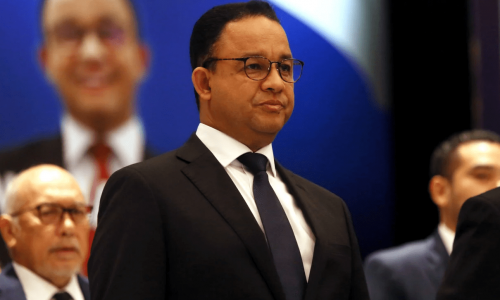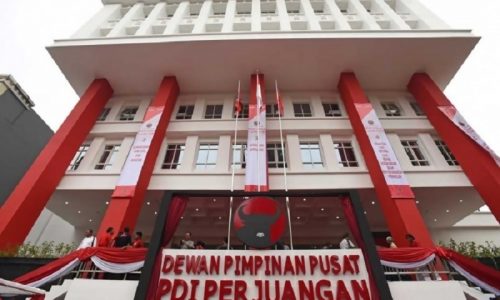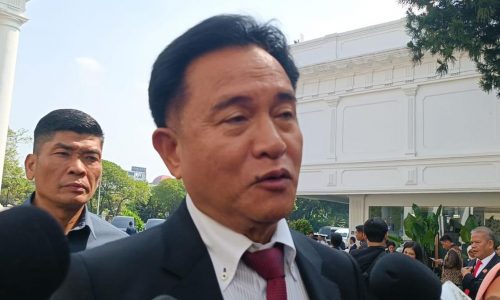The U.S. House of Representatives speaker visiting Taiwan is seen as a provocation against the People’s Republic of China. Hendrajit, an expert in geopolitics, said Pelosi’s visit to Taiwan coincided with rising tensions in the South China Sea and an exercise by the US Pacific Command or Super Garuda Shield between South East Asian and Pacific countries, including Indonesia.
On Tuesday, August 2, Speaker of the House Nancy Pelosi arrived in Taiwan on a trip that demonstrated American commitment to the self-ruled island claimed by the Chinese, but China condemned the highest-level U.S. visit in 25 years as a threat to the Taiwan Strait’s peace and stability.
Despite China’s interest in attacking Taiwan, similar to what Russia has done in Ukraine, Hendrajit perceived China to have responded with calculation to the U.S. provocation. Nevertheless, China understands Sun Tzu’s philosophy of war. There was a willingness to attack Taiwan, but on timing, China did not wish to be provoked by the enemy’s dictation to be pushed away. “So China will choose another time, just as Putin did something that the West failed to anticipate, so there must be an element of surprise,” he said.
China has broadened its cooperation with ASEAN nations and South Asian nations that the U.S. unipolar strategy has dominated to a multipolar one. By its maneuvers, the communist country refrains from destroying multipolar expansion.
Teuku Rezasyah, a lecturer in the Department of International Relations at Padjadjaran University, expressed the belief that Nancy Pelosi’s visit to Taiwan is a test of the U.S. Creating the impression that the United States remains committed to its defense commitment, that the U.S. is ready to protect Taiwan at all costs due to the presence of AUKUS, QUAD, and other defense networks. “It has been 25 years since a U.S. high official has visited Taiwan. In the end, symbolism must be there, so if it were an official from the executive branch, there would be a brouhaha, but the official who visits Taiwan comes from the legislative branch, so there is a connection in terms of trials, politics,” he said.
Rezasyah stated that the problem is that China is not as weak as it was in the past. China’s almost identical quality and quantity to the U.S. regarding the economy, defense, technology, diplomacy, and the ability to bind nations in its cooperation scheme has made it more assertive. “China has a high level of self-confidence, as evidenced by its response to the U.S. provocation with battle training in international waters, followed by the flight of its jet fighter closer to Taiwan,” he added. In light of the worsening of Sino-Taiwan relations and the U.S. weapons being supplied to Taiwan, it is positive that Pelosi did not mention Taiwan’s independence or oppose China’s leadership. “For the U.S., symbolism is important. Since it is a low-key event, it carries a strong message,” he said.
According to Rezasyah, it is almost impossible for the U.S. to fight on two fronts simultaneously. In Europe, NATO is facing Russia on a topsy-turvy footing. China and Russia can destroy the United States if they join their forces. Additionally, China and Russia are becoming closer to BRICS, which consists of Russia and India.
The Shanghai Cooperation Organization, composed of China, Russia, and former Soviet Union countries such as Kyrgyzstan and Turkmenistan, has also become increasingly close to China, Brazil, and South Africa. “Moreover, six months after Western nations sanctioned Russia, the Russian economy is still stable, and it is getting stronger than the U.S. dollar and Euro,” he said.
Consequently, the United States must adopt a low-cost, non-dangerous policy with a high impact in such a situation. If the secretary of state, defense secretary, or senate defense committee were to visit Taiwan, serious consequences would exist. “However, Nancy Pelosi is the one who visited Taiwan,” he said. Although symbolic, it is crucial because strategic decisions in the U.S. need to be approved by parliament.
Currently, the United States will not send its officials to Taiwan since China has responded with a systematic well program and demonstrated its defense capabilities. China can operate all variants of Russian fighter jets it has acquired and upgraded. China has shown that it is not dependent on other countries for its defense equipment and cannot be embargoed by any other government. As a result of its technology, China was able to mobilize its military might around the world,” he concluded.
Pelosi met with the chairman of TSMC, the world’s largest chip manufacturer when she was in Taiwan to prevent the company from halting chip deliveries to Chinese companies, which had a significant impact on the global chip industry. According to Heendrajit, despite the tensions between Beijing, Taipei, and Washington, since China took over Hong Kong in 1997, business cooperation between China’s Mainland businessmen, primarily those in South China, Taiwan, Hong Kong, and even Singapore, has been established based on the concept of Chinese overseas, utilizing the access and capitals of Chinese conglomerates abroad.
Rezasyah stated that China and Taiwan have an agreement regarding chips since China largely relies on Taiwan for chip supplies. As a result, China is equally interested in the chips industry continuing to operate. Furthermore, Taiwan is also interested in China’s 1.4 billion chip market. “Pelosi’s visit is also an interference for Taiwan’s chips industry, as China and Taiwan have a mutually beneficial relationship,” he said.
Taiwan is one of the world’s top chip producers, according to Rezasyah. A military attack on Taiwan could destroy chip platforms, communication networks, the world economy, and transportation networks. Pelosi’s visit also demonstrated that the United States respects Taiwan’s technological advancements. Regarding technology, Taiwan and the United States have a secret research and development agreement. “A key objective of the United States is to convince the world that if something bad happens, all countries will be affected. If Taiwan is in difficult circumstances, Pelosi must understand that they will have to relocate people and laboratories. Relocating laboratory research and development results is a difficult task. According to him, this issue may have been discussed during the meeting,” he added.
Reactions.
In the Indo-Pacific Strategy, the U.S. emphasizes the consolidation of as many countries in South East Asia, East Asia, and even South Asia as possible in the U.S. military alliances. Although the U.S. is a member of the Indo-Pacific strategy scheme and other similar defense pacts that include Australia, Japan, and India, the consolidation has not progressed as well as it had hoped. Pelosi’s visit to Taiwan was unsuccessful because Taiwan’s situation tends to be calm, while several ASEAN countries and APEC countries tend to view Indo Pacific strategy as a geopolitical discourse rather than a defense or economic pact,” he said.
According to Agus Setiawan from the Global Future Institute, Pelosi’s visit to Taiwan also resulted in protests at home by the American public. It seems that the American people are reluctant to see their government escalate tensions with China at a time when tensions are also present in Europe between the U.S. Allies and Russia in the context of the Ukrainian war and the Hezbollah threat against Israel, a U.S. ally in the Middle East. According to the most recent polls, most Americans oppose U.S. involvement in the Ukrainian conflict. In contrast, European countries did not pay attention to the Taiwan issue because they focused on the Russian-Ukrainian competition. NATO members have even called for the removal of the United States from the alliance. “As a result, it is difficult for the U.S. and NATO to contend with three fronts simultaneously, such as Taiwan, the Middle East, and Europe,” he explained.
Agus Setiawan observed that the current situation marks the end of Pan Americana, and at the same time, Western hegemony is beginning to wane. The Teheran meeting between Russia and Iran opens up opportunities for other Middle Eastern powers. As a result of Venezuela, Cuba, and Argentina joining BRICS, a new economic power emerged from the South American and Middle Eastern regions. “It is a battle for civilization and the end of Western civilization,” he said. Additionally, he said, the current situation represents a chance to revitalize the East, including Indonesia, due to a significant change in society, economics, and social conditions. The Indonesian people cannot simply remain silent and observe.
Bachelet’s Visit.
In terms of interfering in China’s industrial chain, the United States also introduced restrictions on personnel and enterprises in Xinjiang, intending to impose unilateral sanctions on enterprises and personnel in Xinjiang, China, and attempting to isolate Xinjiang from the global industrial chain. In May 2022, Bachelet visited China, including Xinjiang, where Beijing is accused of imprisoning nearly 2 million Uyghurs and other Turkic Muslims. According to the United States, China did not invite Bachelet, the UN High Commissioner for Human Rights, to visit Xinjiang regarding human rights and other issues. In her remarks, she spoke highly of the human rights problem in Xinjiang.
Following Bachelet’s departure from Xinjiang, China, she was besieged by numerous countries and organizations, including the United States. Bachelet has been the target of pressure and accusations from the United States and specific so-called “human rights organizations.” It is intended to force Bachelet to speak against her will about the restrictions placed on her visit to Xinjiang and to pressure her to release the human rights report on Xinjiang. Through pressure and other methods, the United States has also changed the United Nations High Commissioner for Human Rights practice.
Hendrajit believed that the West, the United States, and European countries hoped to politicize the human rights issues in Xinjiang to destabilize China. However, the measures were ineffective because the data and information circulated contradicted each other. In addition, it is not easy to verify the data. “Due to the predominantly Muslim population in Xinjiang, not Uighur, but another tribe, this constellation has become a matter of concern. Thus, mainstream traditional Muslims in Xinjiang do not have any problems and have a constructive relationship with the Chinese government,” he stated, adding that splinter groups have raised the issue. As the splinter group does not represent the Uighur people, it is difficult for the United States to politicize separatism internationally.
Agus Setiawan pointed out that the United States has used the Xinjiang issue and its allies to spread malicious propaganda or political decay against China. Their propaganda suggests that China oppresses Muslims in Xinjiang. Despite this, in reality, China has allowed people from Muslim countries, including Indonesia, to visit its Xinjiang region. “China has opened Xinjiang, and anyone may visit it,” he explained. In his opinion, however, the United States is trying to steer and control the United Nations, and the mainstream Western media will present a very different picture from what occurs.
At the same time, China and Russia have been prosperous in blocking al Qaeda terrorists. According to Teuku Rezasyah, the United States and other Western nations must respect Michele Bachelet’s visit to Xinjiang and expose what she has discovered there. “Nevertheless, the United States and European countries, which possess high capabilities in remote sensing, may criticize Bachelet’s report to the United Nations,” he said.









